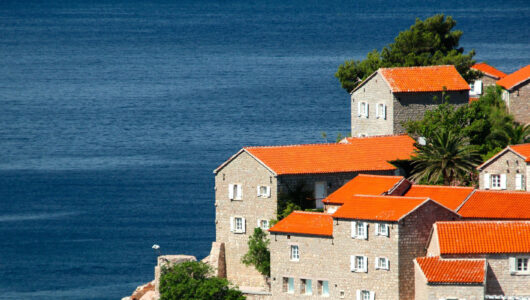Montenegro
Montenegro is a small yet proud nation in Southeastern Europe, nestled along the Adriatic coast. Once a part of the Socialist Republic of Yugoslavia, Montenegro is bordered by Croatia to the west, Bosnia and Herzegovina to the northwest, Serbia to the northeast, the disputed region of Kosovo to the east, and Albania to the south. The country features a stunning coastline that stretches for 293 kilometers, including 75 kilometers of popular beaches, as well as numerous well-preserved ancient towns and fishing villages. In contrast, the northern part of Montenegro is home to some of Europe’s most rugged terrain, with mountain peaks averaging over 2,000 meters above sea level. The country benefits from a Mediterranean climate, enjoying an average of 240 days of sunshine each year. Montenegro’s name translates to ‘Black Mountain,’ which is believed to reflect the dark, dense forests that cover Mount Lovcen (elevation 1,749 meters).

Montenegro Real Estate
Montenegro has indeed become a notable destination for real estate investment over the past 15 years. Its growing popularity as a second-home market is largely driven by its attractive property prices, favorable tax conditions, and an enticing citizenship by investment program. These factors collectively contribute to a dynamic and appealing real estate landscape.
Key Points on Real Estate in Montenegro:
1. Market Overview:
- Emerging Market: Montenegro is still developing as a real estate market, offering significant potential for future capital appreciation.
- Tax Benefits: Low real estate taxes are a major draw for investors and property buyers.
- Citizenship by Investment: The country’s program offers a route to citizenship through investments, particularly in new hotel developments, which further stimulates the real estate sector.
2. Property Acquisition Process:
- Sale and Purchase Agreement: The purchase of property is formalized through a Sale and Purchase Agreement, which is prepared and executed in the presence of a notary public. This agreement follows a standard model.
- Minimal Paperwork: The process involves relatively low paperwork compared to other markets, with the notary assisting in completing the necessary documentation.
3. Legal and Operational Considerations:
- Notary Public: The role of the notary public is crucial, handling both the Sale and Purchase Agreement and the minimal paperwork involved.
- Regulatory Framework: While the process is streamlined, it’s essential for buyers to ensure compliance with local regulations and to engage legal or real estate professionals who are familiar with Montenegrin property laws.
Montenegro’s blend of low taxes, an inviting citizenship program, and an expanding real estate market make it an attractive option for investors and those seeking a second home in the Mediterranean region.
Frequently Asked Questions (FAQ)
Is there any restriction on the acquisition of property in Montenegro by foreign buyers?
No, there are no legal restrictions on foreign nationals purchasing property in Montenegro.
How to acquire immovable property in Montenegro?
Immovable property in Montenegro can be acquired both locally and remotely. It is not necessary to be present in the country during the acquisition. A certified Power of Attorney allows a representative to handle the entire purchase process on behalf of the buyer.
Is it necessary to open a bank account to purchase property, and if so, what is the procedure?
Opening a bank account is not a requirement for purchasing property in Montenegro.
What is the expected return from property investment in Montenegro?
The average net yield from property investments in Montenegro is approximately 4.5%.
How is rental income taxed?
Rental income is taxed at a fixed rate of 15%.
What additional expenses are associated with a real estate transaction?
In addition to the property purchase price, buyers should anticipate notary fees, which are around 0.01% of the property’s value. If the buyer is present in Montenegro, translation fees apply, as Montenegrin is the official language used by notaries. Translation services typically cost around EUR 50 per hour. Alternatively, if a Power of Attorney is used, certification fees will apply. When selling a property, a 3% tax is imposed on the buyer, and the seller may need to pay a profit tax of 15% based on the profit earned.
What other property-related taxes and charges apply in Montenegro?
Real estate tax in Montenegro is proportional, ranging from 0.25% to 1%. This rate depends on factors such as the property’s location, market value, municipality, and property condition. The tax is payable annually.
